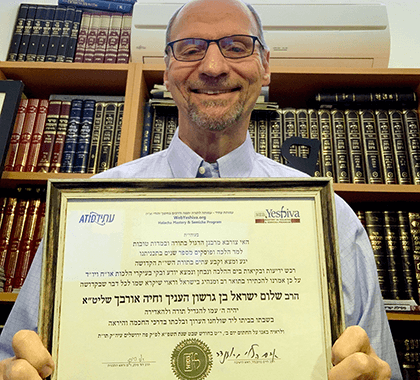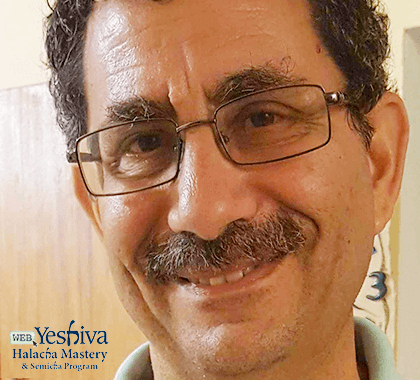Aug 08, 2021
Saul Orbach Receives Semicha from WebYeshiva
Mazal Tov to Rabbi Saul Orbach who completed the WebYeshiva.org and more recently the WebYeshiva.org Semicha Program. WebYeshiva spoke with Rabbi Orbach about his learning experience.
Why did you choose the Halacha Mastery Program? What did you enjoy most about it?
I had just finished learning regularly somewhere when I was offered the opportunity to join the Halacha Mastery Program, which seemed like not only great timing, but a great opportunity, which I embraced wholeheartedly. I very much enjoyed the program. The teachers are all excellent. The content was diverse yet covered the topics needed to ultimately study for Semicha. With the online format, regardless of where I might have happened to be, I could participate in the class. I recall more than one class I logged into while sitting in an airport awaiting my flight. And for the courses I missed, or simply wanted to review again, everything was recorded so that I could do that at my leisure, or on demand. How cool was that!
Although I’d rather have a Chevrusa and learn together in person, I also enjoy learning on my own, so the self-study aspect of the program worked well for me. But it really comes down to all the great teachers who teach in the program. Just excellent, all of them!
What stood out for you about learning Halacha from the sources?
Learning Halacha from the sources is a very exciting undertaking. There are a couple of things I find absolutely fascinating about it, which enhanced the learning so much for me. First, to see the development of the Halacha from the earlier sources, -from the Torah SheBichtav to the Mishna to the Gemara to the Rambam to the Shulchan Aruch, and down the chain of tradition.
Then we get to the Poskim, the Rabbis who develop and refine the practical Halacha we live by today and understanding their methods, including how Halacha deals with new topics and how the Halacha develops around those new topics. For example, an issue that stands out that we covered was the development of electricity. As it turns out, originally, based on their initial understanding (or lack thereof) the Poskim of the day permitted the use of electricity. As the Rabbis’ understanding caught up with the technology, the Halacha changed to prohibit its use on the one hand, and adapt its usage on the other. Another was birth control and how the methods used in the time of the Gemara was adapted to modern day application.
Lastly, to learn the Halachot k’Seder in the Rambam, the Shulchan Aruch, or even in Shmirat Shabbat which we had to study, is to witness the intellectual genius of the authors in codifying law. From one law to the next, systematically developing a code that covers the vast majority of cases, by adding layer after layer, exception after exception, -it’s beyond amazing to realize the monumental accomplishment they were able to achieve all from memory (without computers of course).
Separate from the Halacha Mastery Program what do you like to learn most?
I met Rabbi Brovender about 44 years ago and started learning at Yeshivat Hamivtar in 1979. We go back a long way and I’m proud to say that I continued to learn with him as well as many of the
other great Rabbis/teachers at WebYeshiva from its inception. Rabbi Brovender and I have a weekly chevruta till this day.
Separately, I have been learning Chasidut intensively for close to 15 years and have been teaching a weekly Chabura for the last 5 years. I particularly enjoy the insights into the Penimiut of the Torah that the Chassidic masters offer, that very often upends our typical understandings of standard Meforshim. Sometimes, these are difficult to understand, but like any Torah endeavor, once you do, there’s a sense of accomplishment that comes along with it.
What do you do professionally?
On a professional level, I’ve been involved in the tech startup/venture capital world for the past 33 years. I had periods where I built companies, a period of six years where I turned failing companies around, a 3 year period of social impact investing, and I’m in my 8th year of venture capital work. Additionally, I teach venture capital and entrepreneurship in the MBA programs at Hebrew University, Tel Aviv University, and the Technion. I also work as a high level advisor to companies and non-profits and continue to be active in the entrepreneurial scene on a global level.
--
For more information about the Halacha Mastery Program please visit .
How would you describe your relationship with Rabbi Brovender? What is special about learning Torah with him? What do you enjoy learning most with him?
I first met Rabbi Brovender when he was recruiting for Yeshivat Hamivtar in New Jersey in 1978. He gave an impressive Torah talk (as always, I was to learn), and when I went up to ask him some questions, he told me that the answer to my questions is that I should learn Torah. It was a simple yet profound experience. I started learning at Hamivtar the next year, and eventually, I became the executive director of the Yeshiva as well.
So we had a teacher/student relationship and a work relationship as well that turned into a friendship and personal relationship. I can easily and proudly say that he put me on the path to regular Torah learning. Rabbi Brovender has always been a part of my life since then. I am hardly unique in this feeling, as most of the people who were close to him feel the same way.
He has a very special ability and attribute to make people feel so comfortable, so special, so genuine, that they feel close no matter what. Not everyone makes the effort to stay in touch with him afterwards, but I can tell you that all the ones I know who didn’t, still feel close despite that. I am proud to say that I did maintain my connection over all of these years.
When WebYeshiva was launched, I was one of the first students and was able to reconnect and learn with him, as well as with many of the other great Rabbis/teachers at WebYeshiva, from its inception.
Beyond the classes I take with him in WebYeshiva, I was fortunate that Rabbi Brovender agreed a couple of years ago to learn the Pri Zadik of Rav Zadok HaKohen of Lublin with me weekly. Learning with Rabbi Brovender is a unique experience, especially for me. He is a Talmid Chacham par excellence. His knowledge is vast, his insights are sharp, and his is a very creative mind, so much so that learning together is always a rewarding experience of uncovering understandings and seeing the Torah in new ways. What a joy!





